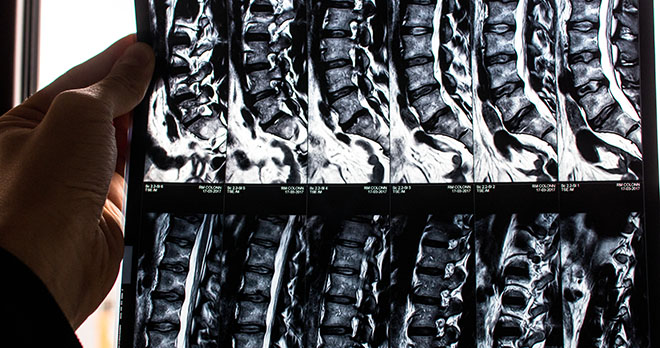The group championing research for spinally injured patients

A spinal cord injury (SCI) can result in lifelong paralysis, or partial paralysis in the case of an “incomplete” SCI, causing loss of control of movements and muscles of the body and loss of sensation and reflex function below the level of the injury. Very often there are other consequences, such as neuropathic pain and impaired bowel, bladder and sexual functioning.
Following a SCI, individuals are also prone to develop medical complications such as bladder infections, lung infections and pressure ulcers. As a solicitor who represents Claimants following a spinal cord injury, I see how these issues impact on all aspects of life, causing loss of independence as well as affecting quality of life.
Recently, I was lucky enough to visit the team at Stoke Mandeville Spinal Research, which is engaged in a variety of innovative projects focusing on the day to day impact of SCI. Working out of their Applied Neurolab, they are striving to identify new ways to reduce the risk of complications and improve neurorehabilitation in the hope that they will ultimately improve quality of life for the spinally injured.
The Soft Extra Muscle (SEM™) Glove
Following a higher level spinal cord injury such as the neck or upper back, individuals may suffer loss of hand function leading to a significant reduction in independence. This is one of the most devastating consequences of a SCI as daily tasks that were once considered simple suddenly become incredibly difficult.
To address this issue, Stoke Mandeville Spinal Research is leading a study to explore if activity-based rehabilitation using the SEM™ Glove can improve impaired hand function and therefore help individuals with an incomplete high-level spinal cord injury have more independence in their own home.
Furthermore, the study will assess whether activity-based rehabilitation performed at home can improve corticospinal neuroplasticity (the ability for the brain to form new synaptic connections following a SCI) so that the brain can communicate better with the affected hand muscles following spinal cord injury.
How does the SEM™ Glove work?
The SEM™ Glove uses artificial tendons, motors and sensors along with sophisticated software to help strengthen grasp function. There are no buttons to press and power is initiated by the user when the slightest pressure is applied to the fingertip sensors. Information travels from the glove’s pressure sensors to a battery powered unit worn by the user.
This portable aid can be invaluable for those with a SCI, helping them to undertake a range of everyday tasks that would otherwise be beyond them following injury. I can think of clients, both past and present, who would benefit enormously from the increased independence the SEM™ Glove can bring.
Neuropathic Pain Project and the “Applied NeuroLab”
Neuropathic pain affects an estimated two-thirds of individuals with SCI and is caused by damage or injury to the nerves that transfer sensory information from the skin, muscles and other parts of the body to the brain. People often use words such as “burning, stabbing or tingling” to describe neuropathic pain which can affect areas that have normal sensation as well as areas that have little or no feeling.
Neuropathic pain needs to be better understood in order to improve essential pain management following a spinal cord injury and Stoke Mandeville Spinal Research is currently working on precisely this, to include how it is caused by SCI and how it can be controlled. My clients often describe significant neuropathic pain which can be incredibly debilitating, so a better understanding of this and progress towards controlling the pain would undoubtedly improve the lives of many.
Who are Stoke Mandeville Spinal Research?
Stoke Mandeville Spinal Research is a charity that brings together individuals who have suffered a spinal injury, their carers, healthcare professionals and researchers.
There are many foundations working to find a cure for spinal cord injury, but Stoke Mandeville Spinal Research focuses a lot of its energy on the here and now; helping to improve quality of life for the spinally injured and helping them realise their full potential. The work they do will undoubtedly improve the lives of many who have suffered a spinal cord injury.
If you would like to support Stoke Mandeville Spinal Research to continue working on life-changing projects please visit https://lifeafterparalysis.com/fundraise/donate-now/, or if you would like to read more about the research charity please visit https://lifeafterparalysis.com/what-we-do/.